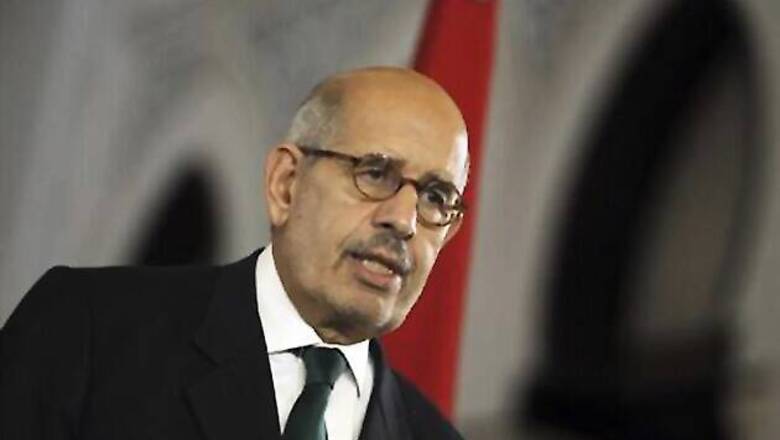
views
Egypt's interim vice president, Mohamed ElBaradei, resigned on Wednesday after the security forces used force to crush protest camps of supporters of the deposed Islamist President Mohamed Morsi, but fellow liberals did not follow suit.
In a resignation letter to Interim President Adly Mansour, the former UN nuclear agency chief said: "The beneficiaries of what happened today are those who call for violence, terrorism and the most extreme groups.
"As you know, I saw that there were peaceful ways to end this clash in society, there were proposed and acceptable solutions for beginnings that would take us to national consensus," he wrote.
ElBaradei, a Nobel peace prize winner and co-leader of the secular National Salvation Front (NSF), was the most prominent liberal to endorse the military overthrow of Islamist President Mohamed Morsi last month following mass protests.
His willingness to participate in the army-installed interim government lent civilian respectability to the takeover.
Other liberals chose to remain in government, at least for now, after at least 235 people were killed in the worst day of violence in Egypt for decades, but several were wrestling with their consciences.
Rumours of other officials' resignations spread but were denied. Deputy prime minister Ziad Bahaa El-Din, another senior NSF figure, told Reuters he had not quit but declined further comment on the political situation at this stage.
Military and diplomatic sources said ElBaradei had made clear in advance he would not stay on board if pro-Morsi protests were dispersed violently.
"It has become difficult for me to continue bearing responsibility for decisions that I do not agree with and whose consequences I fear. I cannot bear the responsibility for one drop of blood," ElBaradei said.
Although his departure was expected, it exposed disarray in the NSF, an umbrella organisation of six parties that is one of the main remaining civilian political forces after the ejection of Morsi's Muslim Brotherhood.
The NSF initially praised the security forces' move to end the pro-Morsi sit-ins as a "victory for Egypt over political currents that abuse religion (a reference to the Brotherhood and its Islamist allies)".
A later statement said the NSF continued to support the government and had no advance knowledge of ElBaradei's decision.
Two NSF insiders said many youth activists and other members were confused by the departure of ElBaradei, who is well respected among the bloc's parties.
Tamarud, the youth movement that led the June 30 protests that led to Morsi's downfall, condemned ElBaradei's decision in a statement as "an escape from responsibility".
The NSF had been seen as a weak, divided opposition unable to galvanise street protests against Morsi. Its endorsement of Tamarud's petition campaign to force Morsi out gave it new momentum that could have yielded political gains if it had remained united, political analysts said.
Independent Islamist activist Abdel Rahman Youssef welcomed ElBaradei's move, saying in a tweet: "You are the conscience of this people..." But leftist movie director Khaled Youssef slammed the resignation as a "betrayal of the Egyptian people".




















Comments
0 comment